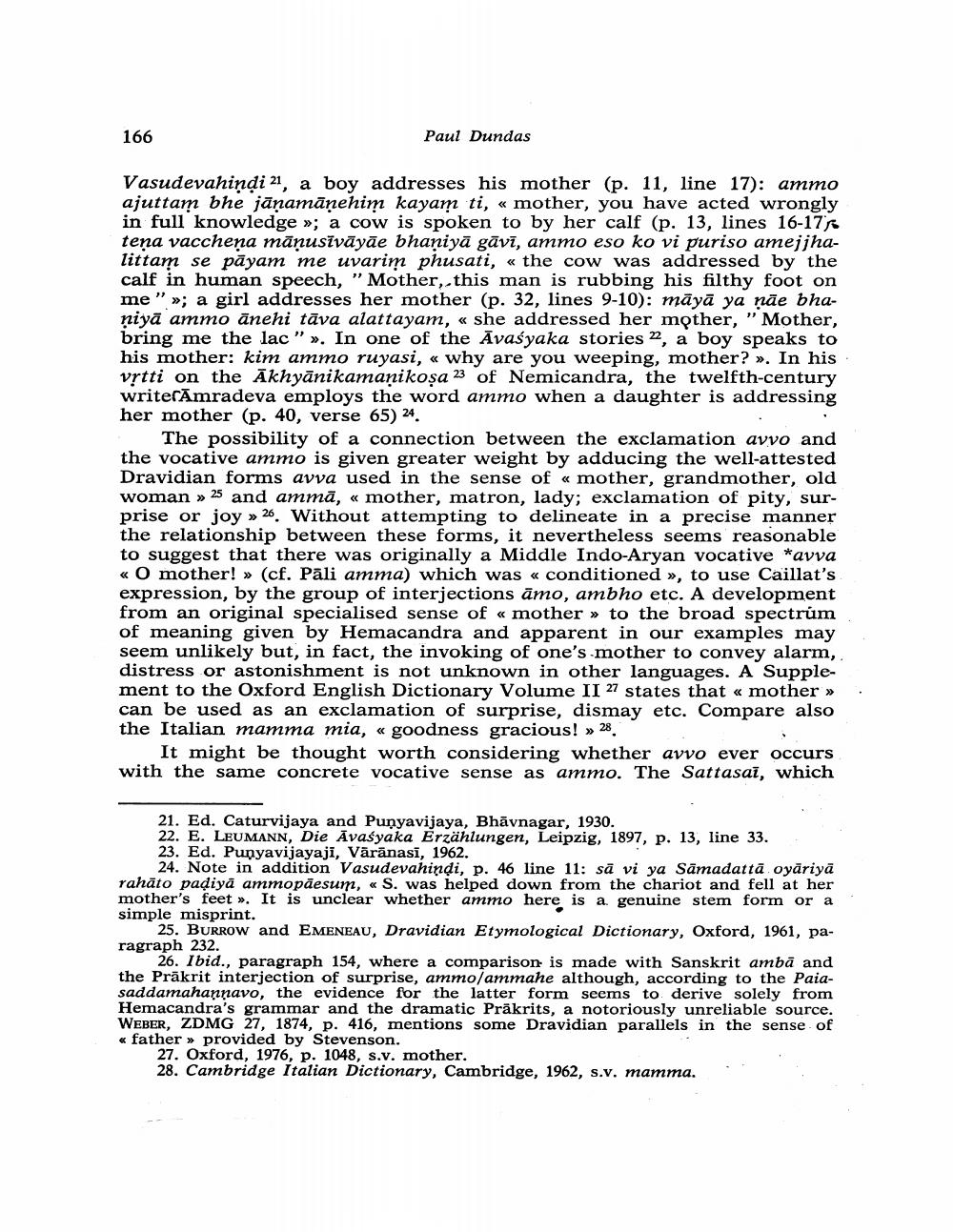________________
166
Paul Dundas
Vasudevahindi", a boy addresses his mother (p. 11, line 17): ammo ajuttam bhe jäņamänehim kayam ti, a mother, you have acted wrongly in full knowledge »; a cow is spoken to by her calf (p. 13, lines 16-17 teņa vaccheņa māņustvāуãe bhaṇiyā gāvi, ammo eso ko vi puriso amejjhalittam se payam me uvarim phusati, « the cow was addressed by the calf in human speech, "Mother, this man is rubbing his filthy foot on me "»; a girl addresses her mother (p. 32, lines 9-10): māyā ya nae bhaniyā ammo anehi tāva alattayam, « she addressed her mother, "Mother, bring me the lac "». In one of the Avaśyaka stories 22, a boy speaks to his mother: kim ammo ruyasi, « why are you weeping, mother? ». In his vrtti on the Akhyānikamanikoşa of Nemicandra, the twelfth-century writerAmradeva employs the word ammo when a daughter is addressing her mother (p. 40, verse 65) 24.
«
The possibility of a connection between the exclamation avvo and the vocative ammo is given greater weight by adducing the well-attested Dravidian forms avva used in the sense of « mother, grandmother, old woman » 25 and ammā, « mother, matron, lady; exclamation of pity, surprise or joy » 26. Without attempting to delineate in a precise manner the relationship between these forms, it nevertheless seems reasonable to suggest that there was originally a Middle Indo-Aryan vocative *avva « O mother! » (cf. Pāli amma) which was << conditioned »>, to use Caillat's expression, by the group of interjections amo, ambho etc. A development from an original specialised sense of « mother» to the broad spectrum of meaning given by Hemacandra and apparent in our examples may seem unlikely but, in fact, the invoking of one's mother to convey alarm, distress or astonishment is not unknown in other languages. A Supplement to the Oxford English Dictionary Volume II 27 states that << mother >> can be used as an exclamation of surprise, dismay etc. Compare also the Italian mamma mia, « goodness gracious! >> 28
It might be thought worth considering whether avvo ever occurs with the same concrete vocative sense as ammo. The Sattasai, which
21. Ed. Caturvijaya and Punyavijaya, Bhavnagar, 1930.
22. E. LEUMANN, Die Avasyaka Erzählungen, Leipzig, 1897, p. 13, line 33. 23. Ed. Punyavijayaji, Vārānasī, 1962.
24. Note in addition Vasudevahindi, p. 46 line 11: să vi ya Sāmadatṭā oyāriyā rahāto paḍiyā ammopãesum, « S. was helped down from the chariot and fell at her mother's feet ». It is unclear whether ammo here is a genuine stem form or a simple misprint.
25. BURROW and EMENEAU, Dravidian Etymological Dictionary, Oxford, 1961, paragraph 232.
26. Ibid., paragraph 154, where a comparison is made with Sanskrit ambā and the Prakrit interjection of surprise, ammo/ammahe although, according to the Paiasaddamahanṇavo, the evidence for the latter form seems to derive solely from Hemacandra's grammar and the dramatic Prakrits, a notoriously unreliable source. WEBER, ZDMG 27, 1874, p. 416, mentions some Dravidian parallels in the sense of << father>> provided by Stevenson.
27. Oxford, 1976, p. 1048, s.v. mother.
28. Cambridge Italian Dictionary, Cambridge, 1962, s.v. mamma.




